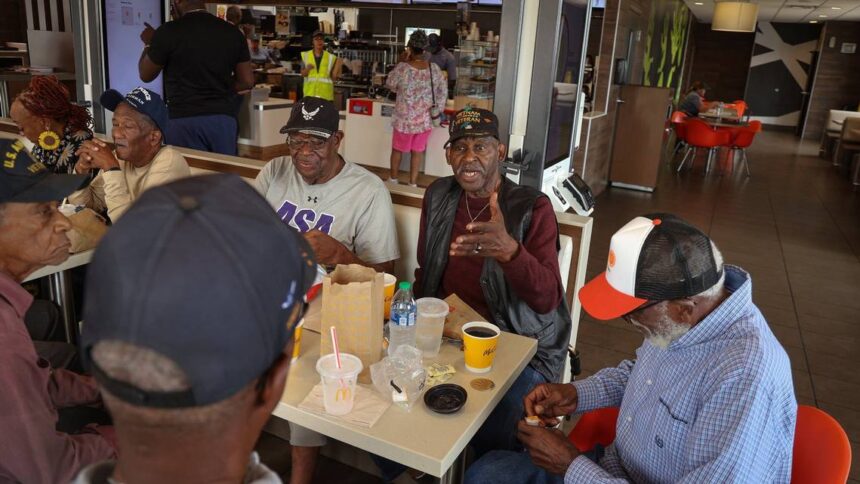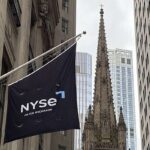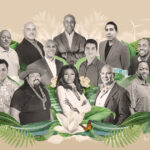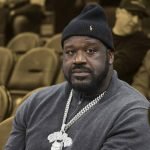For more than 20 years, a group of Black military veterans has gathered at a McDonald’s in North Miami-Dade for breakfast every morning of the year, except for Christmas.
The group, which can reach nearly 20 people on a good day, holds court at table 112 starting around 9 a.m., though they often stay until long after the menu has switched over from breakfast to lunch. On a recent weekday morning, an older woman in a wheelchair rolled up to a touchscreen kiosk directly behind them, unaware that breakfast service had ended. She turned to Marine veteran Roosevelt Randolph for answers.
“There ain’t no biscuits?” she asked him.
“Hell nah, they don’t got no biscuits!” said Randolph, 77. The dining area erupted in laughter.
The group’s longstanding, unofficial reservation has made its members the undisputed VIPs of the McDonald’s at 9250 NW Seventh Ave. Lingering for hours — to swap stories, poke fun at each other and unwittingly draw an audience — is a core component of the group, which, in two decades, has never been named. Though they gather daily around trays of hash browns and sausage biscuits, what’s really being served are memories.
Bryan Bentancourt became co-owner of the franchise in 2012. He estimates that the group spends $18,250 at the location each year but believes the value of their patronage extends well beyond that.
“They take care of this restaurant like it’s their own,” he said. “A fun, nice vibe in a restaurant is extremely key. There is an extremely warm vibe when you walk in [because of them].”
Joining the military was not one of many options for the men of table 112 — it was the only option.
“A lot of us couldn’t afford to go to college,” Randolph said. “So the military was the next best thing for us to do.”
As a boy growing up on welfare in a single-parent household in the 1960s, Randolph began to resent civil rights leader Dr. Martin Luther King Jr. He remembers having to ride in the back of the bus in Miami and was unclear about how social justice could improve his life.
“I hated him because I didn’t like the fact that Black people were getting beaten up [in downtown Miami] and getting dogs put on them [and sprayed] with a water hose,” he said. “I didn’t have anybody in my family to tell me what that was all about.”
After completing two tours in Vietnam, Randolph returned to Miami in 1969 with a different frame of mind. He finally understood the mission behind King’s work.
While he remembers hanging out with friends and going out dancing when he got home, what he had seen in war weighed on him.
“Everybody coped with a lot of stuff when I got back from Vietnam,” he said. “Guys were snorting coke, smoking weed and some other things.”
The men who meet at the McDonald’s are as young as 62 and as old as 90. Leonard Hopkins is the elder statesman of the group. The Brownsville widower has been attending the breakfast meetings for more than 20 years, and since retiring from his job as a mechanic in 2016, he is more present than ever.
Hopkins grew up in Coconut Grove during the 1940s and spent much of his time as a kid at his grandfather’s bicycle shop. He was fascinated by the mechanics of bicycles, cars and planes and wanted to study aviation after he completed high school. Weeks after his graduation in 1951, he got a sobering dose of reality.
“Three of us went down to Lindsay Hopkins [Technical College], and they told us Blacks couldn’t take aviation,” he remembers. “All three of us went and joined the Air Force.”
Hopkins later found out that he was among a small number of Black airmen to serve on a plane.
“What I didn’t know was that about 80% to 90% of the Black people in the Air Force were in food service or in the motor pool,” he said.
Before he was a member of table 112, Berry would come into the McDonald’s for coffee before work and was intrigued by the group’s consistency in meeting. One day about six or seven years ago, he introduced himself and quickly made friends with members of the group.
Being part of his country’s armed forces brought him a sense of community and shared responsibility — something he believes younger generations would benefit from.
“I think a lot of these kids need to go into the military to learn some structure and some discipline,” he said.
This life “ain’t no individual thing,” he added. “No, it takes all of us to do this.”
The bond between group members extends beyond breakfast. Some carpool to the restaurant in the morning. Many are part of a group text. Randolph and Berry have each attended funerals for members of the group as their ranks have gradually dwindled over the years.
Outside the controlled environment of the McDonald’s, the Miami they grew up in is constantly changing. Gentrification has forced many Black residents to move, and housing prices are at an all-time high.
The childhood home in Coconut Grove that Hopkins grew up in was built by his father in 1931, two years before Hopkins was born, but his family no longer owns it. Hopkins estimates that the house and other homes in the neighborhood are now worth between $3 million and $5 million.
“I said if I ever get in a position to buy it back, I’d like to buy it back,” he said. “I just wanted to have that house in my family because that was the house I was born in.”
As Hopkins got up to leave the group on a recent morning, two more men were just arriving to hang out. The next day, and the day after that, and the day after that, the group would return to table 112 for breakfast. Though they rarely stop to define it, their bond is what keeps them coming back.
This story was originally published May 24, 2024, 5:00 AM.











